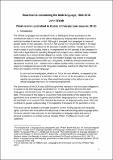| dc.contributor.author | Walsh, John | |
| dc.date.accessioned | 2018-05-22T08:16:12Z | |
| dc.date.available | 2018-05-22T08:16:12Z | |
| dc.date.issued | 2016 | |
| dc.identifier.citation | Walsh, J. (2016). Enactments concerning the Irish language, 1922–2016. Dublin University Law Journal, 39(2) :449-466. | en_IE |
| dc.identifier.issn | 0332-3250 | |
| dc.identifier.uri | http://hdl.handle.net/10379/7367 | |
| dc.description.abstract | The Official Languages Act (henceforth OLA) of 2003 gave limited expression to the
constitutional status of Irish as first official language by obliging public bodies to provide a
restricted number of services in Irish. Although it emerged from campaigns in favour of
greater rights for Irish speakers, the OLA in fact grants only very limited rights in the legal
sense, none of which are related to the provision of public services. Indeed, apart from a
small number of public bodies, there is no requirement for civil servants to be competent in
Irish and no legal basis for recruiting bilingual staff except in very restricted cases. Instead,
public bodies have certain limited obligations, mostly in the written realm, and an
independent Language Commissioner (An Coimisinéir Teanga) has powers to investigate
complaints related to failures to fulfil such obligations, as well as other promotional and
educational functions (s 21). Section 21(f) outlines another of the Coimisinéir’s functions, the
power to investigate failures to fulfil obligations created by enactments other than the OLA
which are related to the Irish language:
to carry out an investigation, whether on his or her own initiative, on request by the
Minister or pursuant to a complaint made to him or her by any person, to ascertain
whether any provision of any other enactment relating to the status or use of an
official language was not or is not being complied with.
The prominence of the OLA since 2003 has given the impression that the state’s obligations
in relation to the Irish language are limited to it.
1
In fact, apart from the OLA the Irish
language is mentioned in over 150 pieces of legislation enacted since the foundation of the
state. The purpose of this paper is to examine these enactments and to assess their
significance as a somewhat forgotten aspect of Irish language policy. In so doing, the paper
will shed light on an aspect of the historical development of language policy since 1922 and
contribute to greater understanding of the legislative framework for the promotion of Irish.
This study can be situated in a broader academic context of language law and language
rights, sub-fields with links both to the disciplines of law and sociolinguistics/language policy.
Particular attention has been paid to the intersection of language rights and policy in
bilingual jurisdictions or entities such as Canada, Wales, the Basque Country and
Catalonia.
2 | en_IE |
| dc.format | application/pdf | en_IE |
| dc.language.iso | en | en_IE |
| dc.publisher | Clarus Press on behalf of the School of Law, Trinity College, Dublin | en_IE |
| dc.relation.ispartof | Dublin University Law Journal | en |
| dc.rights | Attribution-NonCommercial-NoDerivs 3.0 Ireland | |
| dc.rights.uri | https://creativecommons.org/licenses/by-nc-nd/3.0/ie/ | |
| dc.subject | Irish language | en_IE |
| dc.subject | Enactments | en_IE |
| dc.title | Enactments concerning the Irish language, 1922 - 2016 | en_IE |
| dc.type | Article | en_IE |
| dc.date.updated | 2017-11-21T19:36:09Z | |
| dc.local.publishedsource | http://www.dulj.ie/Volume-39_2_2016.html | en_IE |
| dc.description.peer-reviewed | peer-reviewed | |
| dc.internal.rssid | 13028548 | |
| dc.local.contact | John Walsh, Áras Na Gaeilge, Oé Gaillimh. 2563 Email: john.walsh@nuigalway.ie | |
| dc.local.copyrightchecked | Yes | |
| dc.local.version | ACCEPTED | |
| nui.item.downloads | 575 | |


